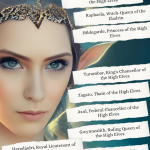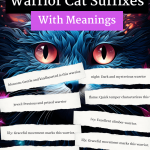Fantasy Classes Generator
Crafting a rich fantasy setting starts with its inhabitants. But what if you’re stuck, unable to decide what kind of fantastical heroes (or villains!) will populate your world? Our Fantasy Classes Generator is here to jumpstart your imagination with a click. This clever tool goes beyond the typical fighter-mage-rogue trio, offering a plethora of unique fantasy class ideas to spark your creativity and help you build a truly captivating fantasy world.
Fantasy Classes Generator
Our Fantasy Classes Generator will spark your imagination with unique ideas for your next fantasy character:
Keep on reading for some tips on creating your own unique fantasy classes.
What are Fantasy Classes?
Fantasy classes are categories that define a character’s abilities and playstyle within a fantasy setting, typically in role-playing games (RPGs) or fictional worlds. They are essentially like character archetypes but with more specific rules and limitations.
Here’s how most fantasy classes are broken down:
- Function: Classes help establish a character’s strengths, weaknesses, and overall approach to adventuring.
- Specialisation: Each class focuses on a particular area, like combat, magic, stealth, or support.
- Progression: Many games allow characters to level up within their class, gaining new skills and abilities as they progress.
So, fantasy classes are a way to structure character creation and development within a role-playing game or fantasy world. They provide a framework for players to build unique characters with distinct strengths and weaknesses, making for a more interesting and strategic gameplay experience.
The Most Common Fantasy Classes
There are three fundamental fantasy classes that act as the foundation for many others:
- Fighter: The brave warrior, specialising in physical combat. They are the frontline fighters, wielding various weapons and armour to deal heavy damage and soak up enemy attacks.
- Mage/Wizard: The magical powerhouse, wielding spells and manipulating arcane energy. They can unleash powerful blasts, buff allies, or control the battlefield with elemental magic.
- Rogue/Thief: The stealthy trickster, skilled in deception and agility. They excel at navigating unseen, picking locks, disarming traps, and dealing quick, lethal blows from the shadows.
These core classes often have variations that build upon their core strengths:
- Fighter variations: Paladin (holy warrior), Barbarian (savage brute), Ranger (skilled tracker and archer)
- Mage/Wizard variations: Sorcerer (innate magic user), Warlock (gains power from a pact), Druid (nature magic user)
- Rogue/Thief variations: Bard (skilled in music and deception), Assassin (master of stealth and lethality)
These variations, along with entirely new classes, become more common in complex fantasy RPGs. Here are some other frequently encountered classes:
- Cleric: A divine spellcaster who heals allies, channels holy power, and may even turn undead.
- Ranger: A wilderness expert who combines combat skills with nature magic and animal companions.
- Bard: A support class that uses music and storytelling to inspire allies, hinder enemies, and sometimes even cast magic.
This list isn’t exhaustive, but it gives you a good idea of the most common fantasy classes you’ll encounter in RPGs and fantasy fiction.
How to Create Unique Fantasy Classes
When creating a unique fantasy class system, you should think about the following:
- Identify a Niche: Start by brainstorming a gap in the typical fantasy party dynamic or a unique power set you find interesting. Is there a cool historical figure or mythological concept you want to translate into a class? Perhaps a subclass focusing on a specific element or a character who manipulates emotions?
- Define the Role: Will this class be a frontline fighter, a damage dealer, a supporting character, or something else entirely? Consider how they’ll complement or challenge the existing class roles.
- Source of Power: Where does this class get its abilities? Is it magic, raw talent, technology, or a pact with a mysterious entity? This will influence their skills and limitations.
- Core Mechanics: Develop the core gameplay mechanics that define this class. What kind of weapons or tools do they use? Do they have unique resource management systems, like energy points or limited uses per day?
- Special Abilities: This is where you get creative! Craft unique skills that set this class apart. Can they manipulate gravity? Do they summon illusions to confuse enemies? Think about both offensive and defensive capabilities.
- Progression System: How will this class gain power as they level up? Will they unlock new spells, master weapon techniques, or gain access to powerful artefacts?
- Aesthetics and Lore: Flesh out the visual identity and backstory of this class. Do they wear distinctive armour or wield specific weapons? Is there a code of conduct or a hidden society they belong to?
- Balance and Playtesting: Once you have a solid concept, consider how this class interacts with others in terms of balance. Will they overpower other characters? Playtest your class with friends or virtually to identify any issues and fine-tune the mechanics.
- Refine and Iterate: Based on playtesting and feedback, refine your class, adjust abilities, balance power levels, and solidify the concept.
This is a flexible framework, so feel free to adapt it to your creative process. Remember, the most interesting classes often combine familiar elements in unexpected ways, so have fun experimenting!
Techniques for Creating Fantasy Class Names
There are several techniques you can use to create unique names for your fantasy classes. Here are some methods that combine different types of words:
- . Noun + Noun: This is a classic approach that creates clear and descriptive names. Examples: “StormHerald” (wields weather magic) and “DreamWalker” (travels the dreamscape),
- . Adjective + Noun: This method emphasises a key characteristic of the class. Examples: “Silversmith” (Creates magical objects from silver) or “EchoAssassin” (sound manipulation to create illusions)
- Noun + Verb: This approach highlights the action associated with the class. Examples: “Monster Hunter” (tracks and slays beasts), “Shapeshifter” (transforms into different creatures), “War Dancer” (fights with rhythmic chants).
- Mythological Reference + Noun: Borrowing from myths and legends can add depth and a sense of history. Examples: “Valkyrie Archer” (inspired by warrior maidens), “Siren Songstress” (enchants with song like mythical creatures), “Golem Crafter” (creates living statues).
- Foreign Language Twist: Using words from other languages can add a touch of mystery and intrigue. For example: “Wu Xing Master” (referencing the five elements in Chinese philosophy), “Druida Céilí” (combining Celtic and Druid for a nature magic user), “Oni Slayer” (Japanese demon slayer).
Bonus Tip: Consider using suffixes or prefixes commonly associated with fantasy classes, like “-mancer” (magic user), “-breaker” (destroyer), “-warden” (protector), or “-born” (gifted with a specific ability).
Remember, the best names are often short, memorable, and reflect the essence of the class. Combine these techniques, experiment with different word combinations, and don’t be afraid to get creative!
Fantasy Classes Ideas
Here are some ideas for fantasy classes, considering both common archetypes and some more unique concepts:
- Stormsinger: A bard who uses music to manipulate the weather, summoning storms, calming winds, or even calling down lightning strikes.
- Dreamwarden: A protector who patrols the dreamscape, fighting off nightmares and guiding lost souls back to the waking world.
- Stoneweaver: A spellcaster who manipulates earth and rock, creating living golems, shaping the battlefield, and even burrowing through the ground.
- Plaguedoctor: A healer who specialises in treating deadly diseases, using a mix of alchemical concoctions and surgical techniques.
- Mirageweaver: A master illusionist who creates realistic illusions that can confuse enemies, distract them, or even create elaborate traps.
- BeastWhisperer: A master tracker and negotiator who can communicate with animals, calming beasts, forming alliances, and even commanding them in battle.
- Runecarver: Enchants weapons, armor, and even locations with powerful runes that grant different magical effects.
- Wardancer: Buffs allies and debuffs enemies through magical dances and rhythmic chants.
- Chronomancer: A manipulator of time, able to slow enemies, speed up allies, or even see glimpses of the future.
- Shapeshifter: Can transform into different creatures to scout, infiltrate, or even become powerful beasts in combat.
These are just a few ideas to get you started. When creating your own class, consider what kind of role they would fill in a party, what unique abilities they might have, and the source of their power.
Summary
We hope this Fantasy Classes Generator has ignited your creative spark! What kind of fantastical class ideas did you get? Do you have any dream classes you’d love to see come to life in a game or story? Let us know in the comments below, and we’d love to hear all about your unique fantasy heroes!






Comments loading...